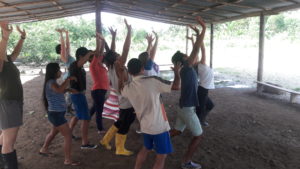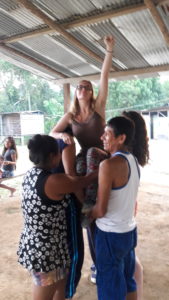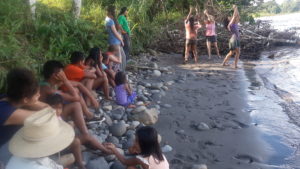<Hola amigo, como está el agua?> <Mojado!>

The typical response still makes me smile even after five weeks of living in the community of Tzawata. I pick my way down the rocky bank towards the wide Rio Anzu. We’re lucky today, it didn’t rain yesterday, and the river is a clear green-blue. The friend I had greeted is out about twenty feet, swimming against the current. On the rock about 30 feet away, in the middle of the river, three children are perched, enjoying the sun. Another woman is washing her clothes down the bank from me, in a rocky area. The slap of the shirt she swings persistently against a rock punctuates the clear sound of a sunny day. Another group of children upstream has seen me coming to the river and is now letting the current bring them down to say hello. I slowly step into the water up to my knees. Despite the heat of the day, the cold still makes me shiver. With a deep breath, I throw myself into the water, taking the plunge all at once.
The Rio Anzu, and the large, old, metal bridge that connects us to the other side, are two of the most iconic parts of Tzawata’s identity for me. An indigenous community of Kichwa Quijos, Tzawata has a long and harrowing story since the time of colonization. Their ancestors had lived around this river for thousands of years, but upon the arrival of the Spanish they were forced to move up into the mountains and made to work as slaves on their ancestral land. The deed to their land eventually made its way into the hands of a Canadian mining company, where it legally remains to this day. Several years ago, when the company briefly had to leave the country for legal reasons, some of the women of made the decision to journey down the mountain and take back their land. They left Tzawata Alta, as the mountainous part of the community is called, and formed what is now Tzawata Baja, which we refer to simply as Tzawata. Since then, the community has engaged in an often ugly struggle against the company and the government branches whose cooperation it has been able to buy. At one point, the police entered and burned down all of the wooden houses. Many community members lost everything they owned, but they refused to move back up the mountain. In a particularly iconic encounter, the police attempted to cross the bridge to forcibly evict the population. The entire community of Tzawata met them on the narrow bridge, blocking the way. Women and children stood at the front and the men in the back with spears. After a long and tense standoff, the police turned back.

After the initial plunge, the icy cold of the water is refreshing. I wade back to the bank for my sack of dirty, smelly clothes and laundry soap. I wet the first shirt in the river and begin to lather it with soap. It’s the same kind of non-biodegradable soap that everyone in the area uses to wash their clothes in the river, but still, I feel the familiar twinge of guilt as I watch the suds disappear downstream.
The community of Tzawata articulates their struggle in many different ways, but the most common ones include their desire to protect their identity and their land. They still cultivate in the traditional way, with many different crops sharing the land, rather than raising one specific crop to sell, which would objectively be more profitable. They also wish to protect the land, and the river which is home to the fish and so much other life, from the inevitable destruction and pollution brought on by mining. They live out this philosophy on top of a literal gold mine.

I make my way through the shirts and move on to socks. The children splash in the water around me, calling to one another and me. Some ask me to watch them playing in the river; others just want to talk to me, to have me ask them about themselves. A few run up the bank and throw themselves recklessly off the edge of the bridge, whooping during the 20-foot drop into the water, and surface triumphant, excited for another round.
The international students, often affectionately referred to as “las gringas,” though not all of us technically fit into that category, are always a huge source of entertainment and attention for the children. That is one of the reasons the community has continued to invite back the “fair trade study abroad” program Rehearsing Change, which brings in international students to take classes alongside community members, around subjects that are useful to the community. No matter how much we make an effort to put all of us on an even playing field, however, the hegemonic structures of globalization never really disappear. Those of us with a little blue book that has our picture in it have access to privileges and resources that the members of this community will most likely never have access to independent of outside assistance. Those of us with light skin, hair, or eyes have access to cultural resources and preferential treatment, in and outside of Ecuador, which our local counterparts never will. To the best of its ability, Rehearsing Change strives to put these advantages at the disposal of the community, giving them the decision-making power to decide how our presence can be used to further their goals – to use the system’s problems against it. But even on this side of the river, across the bridge, there is no fully escaping a white western hegemony. There can only be a consciousness of it, and an effort to resist.
This blog post is part one of a two-part series.
 Originally from Kansas, Sarah Ullom-Minnich currently lives in Pennsylvania where she studies Peace and Conflict at Juniata College. Her involvement as a leader in the Church of the Brethren has included interning with On Earth Peace, volunteering with Brethren Voluntary Service, and being featured on the Dunker Punks podcast. She recently returned from a study abroad trip to Ecuador.
Originally from Kansas, Sarah Ullom-Minnich currently lives in Pennsylvania where she studies Peace and Conflict at Juniata College. Her involvement as a leader in the Church of the Brethren has included interning with On Earth Peace, volunteering with Brethren Voluntary Service, and being featured on the Dunker Punks podcast. She recently returned from a study abroad trip to Ecuador.
Image Credits: Rehearsing Change

